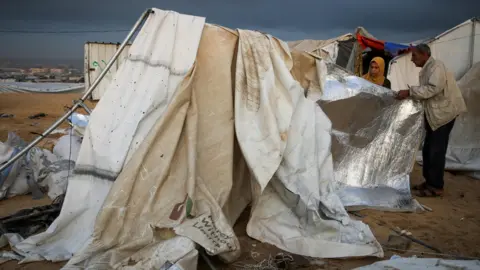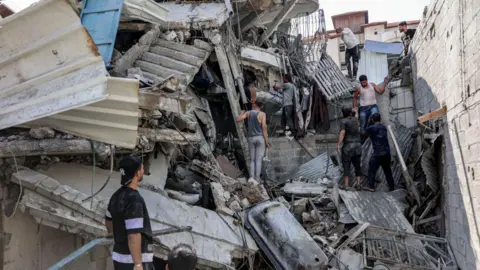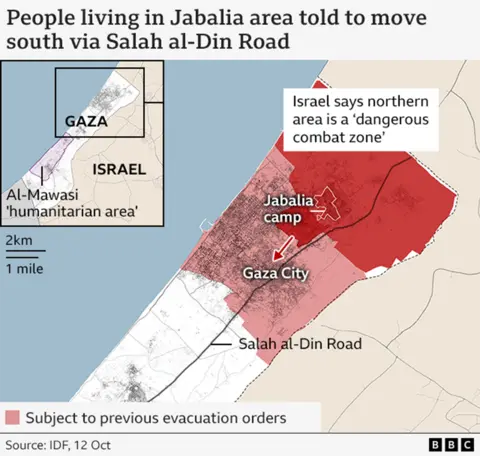 Reuters
ReutersThe US has written to Israel giving it 30 days to increase humanitarian aid to Gaza or risk cutting off some US military aid.
The letter, sent on Sunday, is a strong warning from the United States to its ally and comes amid a fresh Israeli offensive in northern Gaza that has reportedly caused scores of civilian casualties.
The US is deeply concerned about the worsening humanitarian situation, and it says Israel rejected or blocked nearly 90% of humanitarian movements between the north and south last month.
Israel is reviewing the letter, and an Israeli official said the country “takes this matter seriously” and wants to “address the concerns raised with our American counterparts.”
Israel has previously said it is targeting Hamas operatives in the north and has not stopped humanitarian aid.
On Monday, Cogat, the Israeli military body responsible for managing entry into Gaza, said 30 trucks carrying World Food Program aid entered northern Gaza through the Erez crossing.
It ended a two-week period during which the UN It said no food aid had been delivered to the north, and the 400,000 Palestinians there were running out of essential items for survival.
The United States is Israel’s largest supplier of arms, and the Israeli military relied heavily on US-supplied aircraft, guided bombs, missiles and shells in last year’s war against Hamas in Gaza.
The US letter to the Israeli government – the contents of which have now been confirmed by the State Department – was first reported by the website Axios. It was signed by Secretary of State Anthony Blinken and Secretary of Defense Lloyd Austin.
“We are writing now to underscore the US government’s deep concern about the deteriorating humanitarian situation in Gaza and seek urgent and sustained action by your government this month to reverse this trajectory,” it said.
Israeli evacuation orders have forced 1.7 million people into the narrow, coastal al-Mawasi area, where they are “at high risk of infection” due to severe overcrowding and their survival needs cannot be met, according to humanitarian agencies.
“Recent actions by the Israeli government – including suspending commercial imports, denying or banning nearly 90% of humanitarian movements between northern and southern Gaza in September, continuing burdensome and excessive dual-use restrictions, and establishing new vetting and tougher measures. Accountability and customs requirements for humanitarian workers and exports. — along with increased lawlessness and looting — is contributing to the rapid deterioration of conditions in Gaza,” it added.
The letter calls for Israel to take a series of concrete steps to increase aid supplies “within 30 days starting now,” adding that failure could have “implications for U.S. policy.”
It cites U.S. laws that prohibit military aid to countries that obstruct the delivery of U.S. humanitarian aid.
It says Israel must increase “all forms of humanitarian assistance throughout Gaza” before winter, including allowing at least 350 trucks a day to enter through four major crossings and a new fifth crossing, as well as allowing people in al-Mawasi. Move inland.
It calls on Israel to end the “isolation of northern Gaza” by reaffirming that there is “no Israeli government policy of forcibly evicting civilians” from the north to the south.
At a news conference in Washington on Tuesday, US State Department spokesman Matthew Miller told reporters that the letter was “a private diplomatic communication that we do not want to make public”.
“Secretary [Blinken] Secretary Austin thought it appropriate to clarify to the government of Israel that there are changes that need to be made again to see the level of aid they can re-enter Gaza,” he said.
Mr Miller declined to speculate on the consequences for Israel if it does not increase access to humanitarian aid.
But he noted: “Recipients of US military assistance do not arbitrarily deny or obstruct the provision of US humanitarian assistance. That is the law and we will certainly follow the law. But our hope is that Israel will make the changes we have outlined.
He added that the 30-day deadline was not linked to the November 5 US presidential election, adding that it was “appropriate to give them time to resolve various issues”.
Israel has previously insisted there are no limits on aid or humanitarian aid it can deliver into and across Gaza, and blames UN agencies for failing to deliver supplies. It also accuses Hamas of stealing aid, which the group denies.
Before Israel launched a ground offensive in the southern Gaza city of Rafah in May, President Joe Biden first stopped a shipment of 2,000 and 500lb bombs.
But the president immediately faced a backlash from Republicans in Washington and from Israeli Prime Minister Benjamin Netanyahu, who likened it to an “arms embargo.” The suspension was partially lifted in July and has not been repeated.
 AFP
AFPOn Tuesday, the International Committee of the Red Cross (ICRC) warned that families in northern Gaza are “facing unimaginable fear, loss of loved ones, confusion and exhaustion” because of the Israeli offensive that began 10 days ago.
The Israeli military says it has sent tanks and troops back into the town of Jabaliya and its urban refugee camp for a third time.
It has ordered the evacuation of residents of Jabaliya and the neighboring towns of Beit Lahiya and Beit Hanoun to the Al-Mawasi “humanitarian zone”.
About 50,000 people have been displaced to Gaza City and other parts of the north, according to the UN. But many find it unsafe to leave their homes or are unable to because they are sick or disabled.
Khalid, A Jabaliya resident’s accounts of the past year are featured in a new BBC documentaryHe and his family have been living in fear for a week, according to the voice memo.
“We were told to go south, but because the Israeli army surrounded the area, we couldn’t using dirt barricades or quadcopter drones. We couldn’t move, it was very difficult.
“At the same time, we live in constant fear because of the intense blast. My daughter is sick, she has fever. Her whole body is shaking with fear due to the sound of the blast, I don’t know what to do with her. I can’t even take her to the hospital,” he added.
Gaza’s Hamas-run Civil Defense Agency said its first responders had recovered the bodies of 42 people killed by Israeli air and artillery strikes in Jabalia and neighboring areas on Tuesday.
They included 11 members of a single family, almost all women and children, whose home was destroyed in an overnight airstrike.
The Israeli military said on Tuesday it had killed “dozens of terrorists” in the Jabaliya area earlier in the day.
Monday, Israeli human rights groups warned of “alarming signs that the Israeli army has begun quietly implementing the generals’ plan”.echoes widespread Palestinian concerns.
The controversial plan calls for the forcible transfer of all civilians in the north, followed by a siege of the remaining Hamas fighters there to force their surrender and the release of Israeli hostages.
The Israeli military denies it is being implemented, saying only that it “keeps civilians out of harm’s way”.
Israel launched a campaign to wipe out Hamas in response to the group’s unprecedented attack on southern Israel on 7 October 2023, which left around 1,200 dead and 251 hostages.
More than 42,340 people have been killed in Gaza, according to the territory’s Hamas-run health ministry.


